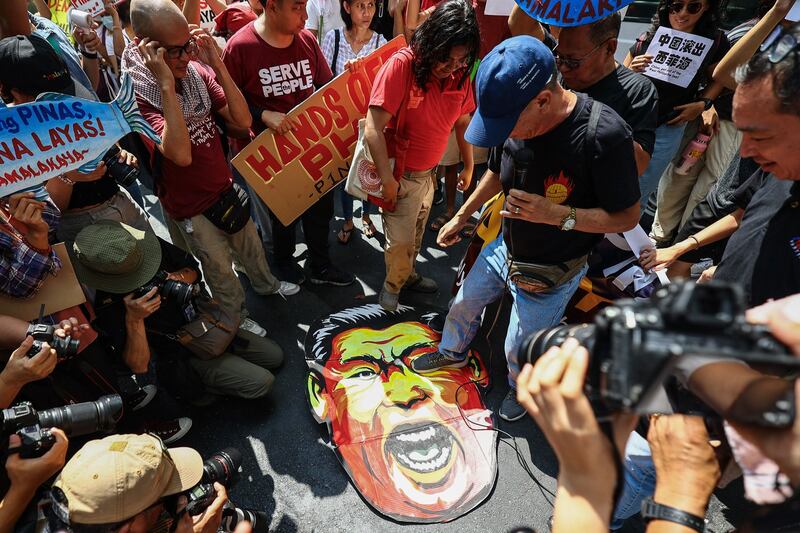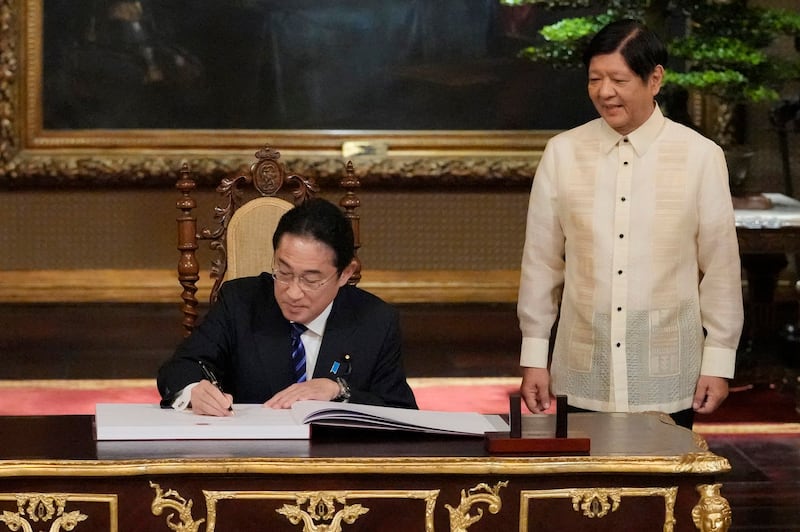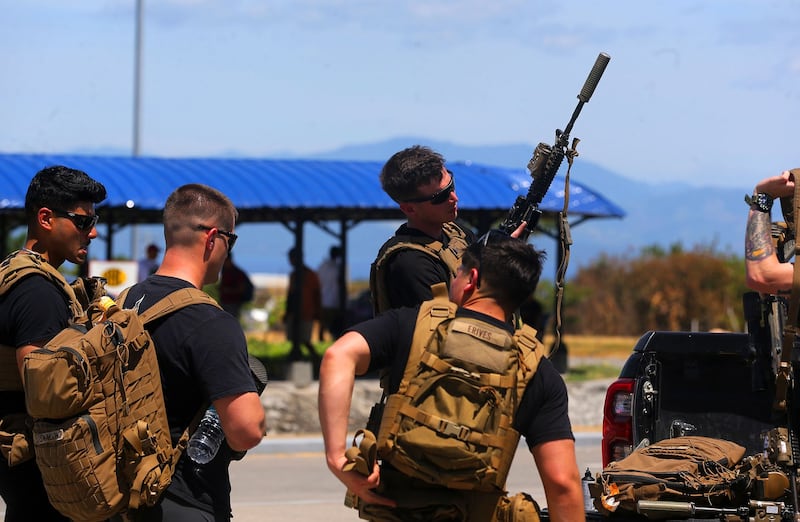U.S. President Joe Biden will host his Philippine and Japanese counterparts this week during a historic summit that aims to bolster cooperation in the South China Sea and strengthen their relationship amid tensions with Beijing, analysts said.
Biden is to welcome Philippine President Ferdinand Marcos Jr. and Japanese Prime Minister Fumio Kishida for three-nation talks at the White House on Thursday. Among other topics, the leaders are expected to discuss freedom of navigation in the South China Sea and launching joint patrols in the strategic waterway, observers said.
Leading up to the summit, the three countries, joined by ally Australia, conducted a large-scale joint exercise in the South China Sea on Sunday. They showcased their collective naval and air power, signaling a shift in defense priorities for Washington, analysts said.
“This trilateral meet shows Biden’s clear South China Sea policy, which was perplexing during the Obama and Trump administrations as America kept mum on pivotal events,” said Chester Cabalza, a defense analyst and founding president of International Development and Security Cooperation, a think-tank in Manila.
Analysts said the summit will serve as a reminder that the Philippines stands with other like-minded nations including the United States, which is bound to a 1951 Mutual Defense Treaty compelling it to come to Manila's aid in the event of an attack by a foreign power.
In Washington, John Kirby, spokesman for the National Security Council, said he expected the three leaders to announce a series of new initiatives during their meeting.
“It’s the first-ever at the leader level, and so we’re going to look to find ways to continue to deepen the collaboration with our closest partners, again, to ensure a free, open, prosperous, secure Indo-Pacific,” Kirby told reporters at the White House on Monday.
Mira Rapp-Hooper,senior director for East Asia and Oceania at the National Security Council, previewed Thursday’s summit by announcing a series of items on the agenda.
“Our leaders will announce new initiatives to enhance energy security, economic and maritime cooperation, partnerships on technology and cybersecurity and some considerable investments in some major infrastructure areas,” she told reporters in Washington on Tuesday without going into specific details.

Lately, tense incidents at sea have increased as Chinese coast guard and militia ships try to block Philippine ships and boats from delivering supplies to Manila's military outpost in Ayungin Shoal (Second Thomas Shoal). The Philippines and China are locked in a territorial dispute over the shoal and other features in the South China Sea.
Tokyo, which has a territorial dispute with Beijing over the uninhabited Senkaku Islands in the East China Sea, has found support from Manila.
Last year, Kishida addressed both chambers of the Philippine Congress – the first time for a Japanese leader since World War II, when Imperial Japan occupied the Philippines – and pledged to boost defense ties.
“This time around, Washington has seen a respectable [show of] support from Tokyo and a braver stance from Manila on its assertive transparency strategy on China’s duplicitous gray-zone tactics aside from its lawfare,” Cabalza told BenarNews on Tuesday.
He praised the Philippines under President Marcos for having “flexed a muscle from a balanced foreign policy to a stout territorial defense operation.”

This week’s summit in Washington is also intended for the three leaders to mount a collective defense against China at a time when the Asian superpower is saddled with economic recession while facing international political tensions, analysts said.
Don McLain Gill, a geopolitical analyst who lectures at De La Salle University’s international studies department in Manila, said the summit could help give pause to China’s “revisionism in the region” where it claims nearly all of the seas.
“What the Philippines is doing is fortifying its capacity to defend what it rightfully owns based on international law,” he told BenarNews – something that goes “against the interests of revisionist powers.
In Beijing, Chinese Foreign Ministry spokeswoman Mao Ning spoke out against the upcoming summit.
“Defense cooperation between any countries should be conducive to regional peace and stability. We oppose cobbling together exclusive groupings and stoking bloc confrontation in the region,” the spokeswoman said during a daily news conference on Monday.
She issued a specific warning to Tokyo in response to a second question during the news conference.
“Japan needs to earnestly draw lessons from history and stay prudent on military and security issues,” Mao told reporters.
South China Sea
Rapp-Hooper reiterated the Biden administration’s commitment to defense of the Philippines in light of recent acts of Chinese aggression against Filipino coast guard ships and boats bringing supplies to the military outpost on the BRP Sierra Madre in Ayungin Shoal.
“The Philippines has found themselves under increasing pressure from the PRC in the South China Sea,” Rapp-Hooper said, using an acronym for People’s Republic of China, its official name.
“The U.S., Philippine mutual defense treaty applies to the Philippines in the South China Sea,” she said, adding it covers “vessels underway including coast guard vessels.
“We stand strongly by our alliance commitment to the Philippines,” she said.
The summit comes at a time when the participating nations are holding joint training exercises focused on maintaining regional security.
Balikatan, a large-scale annual joint exercise, is scheduled for April 22 to May 18. The French Navy is expected to participate in the exercises on the edge of the West Philippine Sea, Manila's name for South China Sea waters that lie within its exclusive economic zone.
But while these activities are designed to rattle China, the upcoming summit in Washington could do more to inflame tension, political analyst Rommel Banlaoi warned.
“The summit cannot peacefully resolve the South China Sea disputes requiring direct negotiations of the parties concerned,” said Banlaoi, who heads the Philippine Society for International Security Studies.
“It will only intensify major power rivalries,” he told BenarNews.

China has developed its own capabilities, enough for it to believe that it can resist major Western pressure. The summit likely would motivate Beijing “to develop further capabilities to recover from centuries of humiliation from Western powers,” Banlaoi said.
During the multi-nation exercise over the past weekend, two Chinese navy ships were observed monitoring from about six nautical miles away, said Gen. Romeo Brawner, the Philippines’ military chief.
While noting China’s presence, Brawner said the joint training with “like-minded armed forces” signified that allies were ready to lend a helping hand.
The summit also signals Marcos’ preference to align with the West, a clear departure from Duterte’s pro-China stance, he said.
During an interview with a local radio station on Monday, Marcos called the weekend’s exercise successful even as his administration seeks to avoid similar incidents involving Chinese ships.
“We’re doing everything we can to talk to the Chinese leadership, and tell them not to heighten the tension and let’s just talk well so we can avoid collisions, water cannons,” Marcos said in the interview, according to the state-run Philippine News Agency.
Late last month, Marcos’ administration summoned a Chinese diplomat to protest against the “aggressive actions” of the China Coast Guard in the South China Sea, following a March 23 incident that left three crew members aboard a Philippine supply boat injured.
BenarNews is an RFA-affiliated online news organization.
